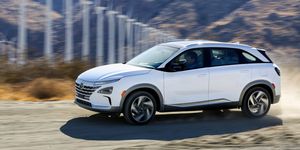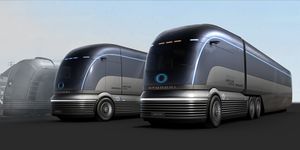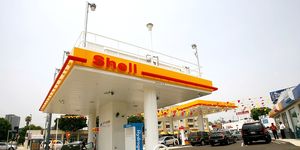- Hyundai says it will deliver five Nexo fuel-cell vehicles to the U.S. Department of Energy and help build a refueling station in Washington, D.C., for them.
- The automaker also gave the feds a single Nexo vehicle in 2019.
- Hyundai has been working with the federal government on hydrogen technology since 2004.
Hydrogen fuel-cell vehicles have an uphill battle with consumers. The infrastructure needed to actually keep them on the road is only available in a few areas in the United States, so sales are small and fueling stations few. But the tech behind these electric vehicles that don’t have to be charged is still important enough for the U.S. government to continue research.
Hyundai has announced that it is expanding its partnership with the U.S. Department of Energy on research into hydrogen fuel-cell vehicles. The automaker will deliver five Nexo FCEV (Fuel-Cell Electric Vehicles) to the depart and help in the installation of a fueling center in the Washington DC area.
The vehicles and station are part of the DOE’s hydrogen and fuel-cell program that does research into the technology as it pertains to transportation.
The five new Nexo cars will join one Hyundai sent to the DOE in 2019. Hyundai and the feds have been partnering on hydrogen technology since 2004. At the time it offered 33 fuel-cell vehicles for its Controlled Hydrogen Fleet and Infrastructure Demonstration and Validation Project.
The announcement came at a weird moment, on the same day that the Trump administration announced its new budget that would cut funding for the Advanced Technology Vehicles Manufacturing Loan Program. This is the program that successfully loaned (and was repaid) huge sums to Tesla and Nissan to develop the Model S and the Leaf. More recently, it was expected to loan millions to Lordstown Motors, which wants to revamp a shuttered GM plant in Ohio to build electric trucks and other vehicles.
Undersecretary of Energy Mark W. Menezes said in a statement, “Hyundai Motor is proud to partner with and support the U.S. Department of Energy’s Hydrogen and Fuel Cells Program as part of our commitment in supporting the transition to clean energy.” Menezes continued: “To meet this commitment, it is essential that we collaborate with industry. We are pleased to partner with Hyundai to help advance fuel cell and hydrogen technologies and ensure our nation’s sustainable transportation future.”
Of course, partnering with an established automaker and getting some vehicles isn’t the same as securing a loan for a startup. But the trajectory of both companies is cleaner energy for transportation, so this currently small-scale project is worth watching.
Source: Motor - aranddriver.com






